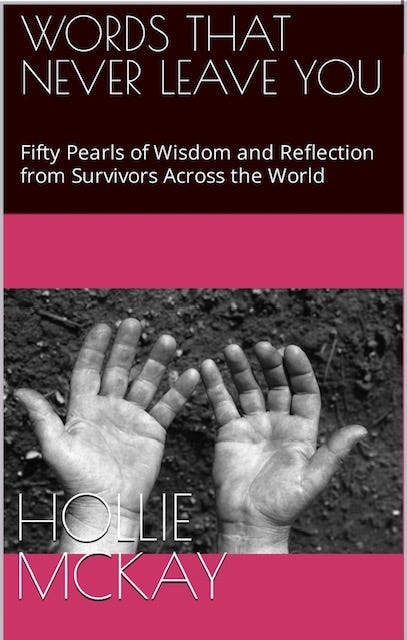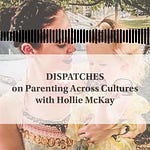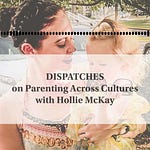TRANSCRIPT. PODCAST FEATURING HOLLIE MCKAY & DENNIS SANTIAGO. (Please excuse typos, edited for clarity)
DS: Welcome back to another “Words that Never Leave You: Fifty Pearls of Wisdom and Reflection from Survivors Across the World” by Hollie McKay, Holly. Today we have a lengthy quote, but a poignant one: “How would you feel if I went to your homeland and started recruiting your countrymen to fight its own people? Wouldn't you want to fight us back?” Tell us about this one.
HM: So this one is a tough one. I think for a lot of especially Americans is is hard to swallow. But this quote, for me at least, came from a Taliban member, and it really encapsulated the Taliban perspective on the US invasion. So just to recap. Two decades of war in Afghanistan stole the lives and limbs and and the sanity of so many people, both Afghans and foreigners, who had to go to work and fight there. And of course, when the the fall of the US backed government happened in the late summer of 2021 and the very catastrophic departure from American troops, I stayed in the country and much of my time was spent after that really interviewing this new Islamic Emirate government, aka the Taliban.
It was initially a challenge because you never want to spend so much time with the the “enemy” and it is very easy fom afar to look at the Taliban as one-dimensional evil beings. And yet here I was, every day having to interact with them, sit with them, have tea with them, talk to them and and really find out what they were thinking. But there was this one particular Taliban named Asif from Logar Province. He was about my age and joined the Taliban as a teenager. And he said that to me, he said: How would you feel if I went to your homeland and started recruiting your countrymen to fight its own people? Wouldn't you wanna fight us back? In truth, I didn’t have a very solid response to offer. So, whether you agree or disagree, that was an important perspective from the Taliban as to Americans coming into their country, recruiting Afghans to kill them. And the Taliban isn't this sort of foreign entity. It's not ISIS. They're not foreigners. They're not coming from other countries. And thus it's very, very nuanced and very difficult situation to analyze. Most of us would collectively agree if another country came into ours, that we would all fight back. So, there is a lot of moral ambiguity that is tied up with that.
DS: Yeah, well, moral ambiguity was always the probably the hallmark of Afghanistan because many people weren't quite sure we should have been there in the first place and many other people were pretty sure that we, the United States, in particular, they didn't really know how to run a colonial empire and would not prevail in the long run. And so the sentiment actually rings quite true. For not just that place, but I think even inside the United States, where you know, the sentiment is “don't don't come in my backyard.” This quote is a poignant statement, and a legitimate one.
HM: And it's we have to also remember that Afghans themselves didn't actually have anything to do with the attacks of September 11. They were mostly Saudis nationals on those plane and,in the end, bin Laden was found in Pakistan. So, Afghans paid a very heavy price for the fact that, and it's complicated and we can go into it another time, for bin Laden being there. He wasn't necessarily wanted by Mullah Omar and the Taliban. There was a lot more to it than that. But we tend to simplify things a lot.
DS: Yes, actually that's a statement from you that I'm going to remember. We tend to simplify things a lot and and in this case we tend to simplify things from our own perspective. And but I think that young Taliban had the perspective right for his country. I mean, that that's just the bottom line and history did. Prove them right. After all, didn't it? Yeah, any last thoughts?
HM: Just you always remember there's another side to a story and that's what good journalism, you know, that's what we're taught to do is to bring out that other side and it might. Make you angry. And might make you hate me but we have to listen.
DS: Hey, these are very important collection of words. Where can people get this book?
HM: The book is called words that never leave you 50 calls of wisdom and reflection from survivors across the world, and you can find that on Amazon. You can get it and paperback and also as a Kindle. And your supports really value because it's not easy. Being an independent writer and doing this work, so any support is really appreciated.
DS: Thank you, Hollie. And yes, I and I highly recommend a book. It's it's it's a quick read, but man, every page brings you something. Thank you, Hollie. And we'll talk to you again soon.
PURCHASE YOUR COPY OF “WORDS THAT NEVER LEAVE YOU” TO READ MORE REFLECTIONS AND ANECDOTES
** Short read of meaningful lessons gleaned from the ordinary forced to become extraordinary
For speaking queries please contact meta@metaspeakers.org
I am also available for a select number of private coaching sessions for those wishing to write a book or venture into the foreign journalism space. Please contact directly for rates hollie@holliemckay.com
PLEASE CONSIDER A PAID SUBSCRIPTION TO THIS SUBSTACK TO KEEP INDEPENDENT JOURNALISM ALIVE.














Share this post